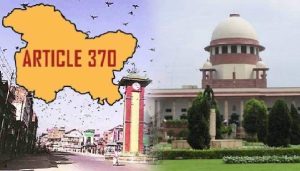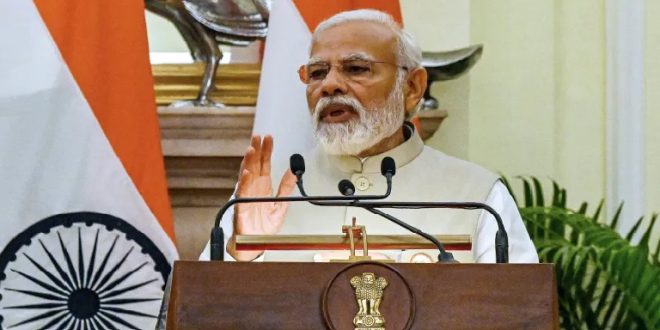01-09-2023
Bureau Report + Agencies
NEW DELHI: The Indian government has told the country’s top court it is ready to hold elections in Indian-administered Kashmir “any time now”.
“The central government is ready for elections any time now. Till date, the updating of voter list was going on which is substantially over,” India’s Solicitor General Tushar Mehta told the Supreme Court on Thursday, adding that a call has to be taken by election officials on when to hold the polls.
 Mehta is representing the federal government in the court as it hears a batch of petitions challenging New Delhi’s controversial 2019 move to revoke the special status of the region.
Mehta is representing the federal government in the court as it hears a batch of petitions challenging New Delhi’s controversial 2019 move to revoke the special status of the region.
The last state assembly elections in Indian-administered Kashmir were held in 2014.
In 2018, Prime Minister Narendra Modi’s Bharatiya Janata Party (BJP), which was a member of a coalition government led by a pro-India political party, withdrew its support, forcing the last elected Chief Minister Mehbooba Mufti to resign.
Later that year, as two rival parties tried to form an alliance in order to claim power, the region’s BJP-appointed governor dissolved the assembly. Since then, Indian-administered Kashmir has not seen any legislative assembly election.
On August 2 this year, a Supreme Court bench headed by Chief Justice Dhananjaya Yeshwant Chandrachud started hearing petitions filed by Kashmiri and other groups and individuals who claim India’s move to scrap Article 370, which granted Indian-administered Kashmir its partial autonomy, was illegal.\
The special law gave exclusive rights on property and jobs to the permanent residents of India’s only Muslim-majority region and allowed it to have its own constitution. It also barred outsiders from settling permanently or buying property in the region, which is also claimed by neighboring Pakistan.
 The Himalayan territory of Kashmir is divided between nuclear-armed India and Pakistan, both of whom claim it in its entirety and have fought two of their three full-scale wars over it.
The Himalayan territory of Kashmir is divided between nuclear-armed India and Pakistan, both of whom claim it in its entirety and have fought two of their three full-scale wars over it.
In the late 1980s, an armed rebellion against Indian rule began in the valley area of Indian-administered Kashmir. The Indian government responded by posting more than half a million soldiers, making it one of the most militarized conflict zones in the world.
Tens of thousands of people, including a large number of civilians, have died in the conflict.
The situation worsened in 2019 when Modi’s government removed the region’s special status and brought it under New Delhi’s direct control by turning it into a federal territory governed by a hand-picked administrator.
Since then, Modi’s Hindu nationalist government has passed a series of laws and policies which residents in the valley say are aimed at changing the demography of the region and deny them their historical rights over their lands and livelihoods.
 Pressmediaofindia
Pressmediaofindia




